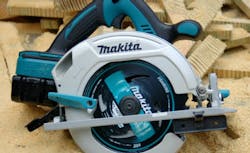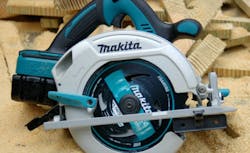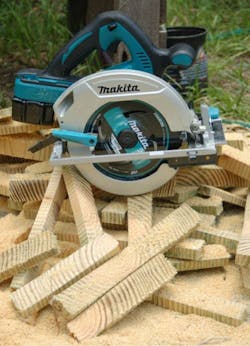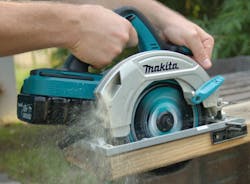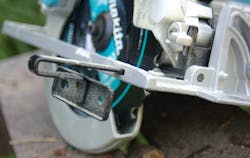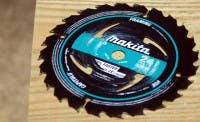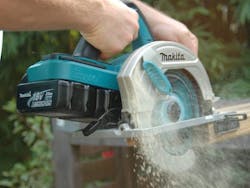Makita XSH01 18V X2 LXT (36V) Circular Saw Review
Best. In. Class.
It’s not hard to review a tool like the Makita XSH01 36V Circular Saw. When you’re testing the leader in any tool category, the outcome is likely predetermined that it will shine. The challenge that it does present, however, is what you compare it to. After all, there’s not exactly a lot of competition out there for a twin battery, 36-volt circular saw.
You might think that comparing a two battery system like this to a single battery system would be unfair. You might think that the Makita would win a head-to-head with no major effort…
You’d be right on both accounts.
Still, the single battery 18/20 volt products have been the industry standard in cordless circular saws and so that current standard is what I’ll be comparing to.
Editor’s Note: This is the original review based on our impressions of the saw after its launch in 2014, but the ratings have been updated to reflect the results of our Cordless Circular Saw Shootout.
Makita XSH01 Circular Saw Features
The Makita 36V circular competes with corded circular saws for a reason. First, the motor delivers 4800 RPM for cutting and—more impressively—ripping of sheet goods as well as dimensional lumber.
Overseas, the Makita 36V tools will come with an actual single 36V pack, but here in the U.S., the company is maximizing its installed base of 18V packs by opting for a dual 18V configuration. This two battery system can deliver the power of a corded saw while letting you make more than two and a half times the cuts as the 18V Makita BSS611Z circular saw.
Unlike smaller 18V tools that use 6-1/2 inch blades, the Makita has a full 7-1/4 inch blade for the same large cutting capacity you’d find in a corded model. For comfort, a rubberized grip and adjustment lever work just as well on bare hands as it does when you’re wearing gloves.
Lastly, when you’re cutting, the integrated dust blower keeps sawdust off your cut line so you can see where you’re going.
Other features I liked include the fact that I could recharge a dead battery in just 30 minutes with the Makita Rapid Optimum Charge System, the magnesium shoe, and the on board wrench that I did not have to hunt down when I wanted to change out the blade. T
he Makita 36V circular saw comes with an electric brake, so you can use it more safely and set it down quickly once a cut is completed.
Field Testing the Makita XSH01 Circular Saw
When the Makita XSH01Z made its way to my hands, I was testing several different brands of blades and did not realize what a treat it was going to be to use this saw for the test. The first test I performed was designed to put the blades (and saw) in the high-stress environment of rip cuts.
You’ll notice that Makita lists rip cutting as one of the features the 36V beast is designed to tackle. This is not the case with all cordless circular saws. Bind up is typically very easy to achieve on a rip cut and it drains the battery quickly. The rip cuts were done through 4-foot sections of 2 x 12 pressure treated pine and were designed as a speed test for the blade. I’ll share some of those results with you in a moment.
The 7-1/4 inch blades were able to rip through roughly 72 feet of lumber while I applied enough pressure to push each blade to cut fast without binding up.
The cuts were made in quick succession with the only break being to change blades halfway through the test. A total of 18 full cuts were made before the batteries finally succumbed.
As they should, the lithium-ion battery packs delivered peak performance to the end with no notable slowdown.
On a second test, and with freshly charged batteries, I tested the blades again, this time doing sets of cross cuts. Time was the test factor again, and I put the saw through sets of 5 cuts and performed the test 3 times with each of 3 blades.
Again, the material being cut was 2 x 12 pressure treated pine. This time, rather than allowing the batteries to drain, I switched them out after 15 cuts. Charge time was only a few minutes for each battery after that small an amount of work on them.
So how did the saw itself do?
The Makita XSH01 handled both cross cuts and rip cuts with ease. Makita claims that it delivers the power of a corded saw and I have to agree.
I tested a 20-volt model immediately following my work with the 36-volt model, and the difference is incredible. While I did not specifically measure the RPM’s during testing, it was clear that the speed of this saw is superior to that of the 20-volt that was tested.
Makita also says that the twin battery 36V Circular Saw has a larger cutting capacity. This is due to the fact that it uses a 7-1/4 inch blade. It has a greater cutting depth than the standard 6-1/2 inch blades of the 18V and 20V models out there.
As for the rubberized grip and adjustment levers, they really do seem to help make adjustments easier and cutting was more comfortable than the 20V model that I used later.
While I did not realize at first that the motor housing was designed to be flat intentionally, I did notice that blade changes were significantly easier than a pair of other saws I had recently tested. After looking over Makita’s specifications and features, it made a lot of sense that it stood out.
The dust blower is built in to keep the line clear, and it was another obvious positive that I recognized while I was cutting.
Another feature that I found to be very helpful was the rip fence. Considering that my goal was to make cuts as quickly as possible, the rip fence (sometimes referred to as guide rule) allowed me to make consistent cuts that would not have been possible without moving much more slowly.
Let’s talk about the stock blade for just a moment.
Makita includes their 24 tooth framing blade with the saw. I was attempting to do some independent testing for another company that was claiming some significant efficiency savings in their design. I initially thought testing it against Makita’s blade would result in the performance I expected, but I was completely wrong!
Here are the facts:
- A cheap 24 tooth aftermarket blade from Home Depot completed the cross cut test in an average of 20.1 seconds.
- Brand X (no, I’m not going to tell you who they are) completed the test in an average of 16.4 seconds—significant time savings.
- Makita’s blade had an average cut time of 12.4 seconds, blowing both other blades out of the water!
Now, I have not tested that blade against some of the high-end ones out there. Considering that Brand X is looking to compete with those high-end brands leads me to believe that I might be buying Makita blades for all of my circular saw needs.
Makita XSH01 18V X2 LXT Circular Saw Specs
- Model: Makita XSH01Z 18V X2 LXT Lithium-Ion (36V) Cordless 7-1/4″ Circular Saw
- Blade Diameter: 7-1/4 inches
- Arbor: 5/8 inch
- Power Source: Two 18V LXT Lithium-Ion Batteries
- Max Cutting Depth: 2-5/8 inches
- Max Cutting Depth at 45 Degrees: 1-7/8 inch
- Max Cutting Depth at 50 Degrees: 1-11/16 inch
- No Load Speed: 4800 RPM
- Weight: 10.1 pounds
Conclusions
There’s really not much to say in terms of improving this saw.
No power meter on the batteries? Makita has a low battery and temperature indicator on the saw. While it’s not exactly the same, it is better than having no idea.
Need more run time? It’s awfully hard to complain about that considering that Makita announced that 4.0 Ah batteries will be coming this month. I hope that they include them in the next kit for this saw.
Two batteries mean twice the charging? Makita’s got the best in class charge time and an available 4-port charger. Again, this is one of the joys of testing the top performing cordless circular saw on the market.
When you compare it to the industry standard and it exceeds it in every tangible way, where do you ask for improvement?
Editor’s Note: The Makita XSH01PT kit ($379) now ships with two 5.0 amp hour batteries with charge level indicators on the back.
Like most products that are class leading, you will pay a premium for the Makita XSH01. At Acme Tools, the bare tool currently is priced at $199, and the kit is $379. Even so, looking at the other options that are in the general price range, Makita outperforms all of them using the no load speed as the benchmark.
The Makita XSH01 is going to be tough to beat. With true corded performance, the ability to utilize a standard 7-1/4″ blade, and a surprisingly outstanding stock framing blade, I just don’t see a good reason to choose another cordless circular saw over this one.
—This article, written by Kenny Koehler, originally appeared on ProToolReviews.com and shows up here because they are an awesome bunch of folks.
